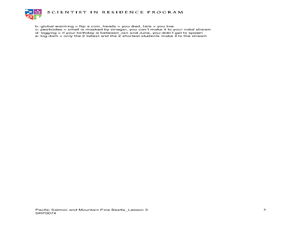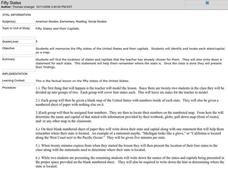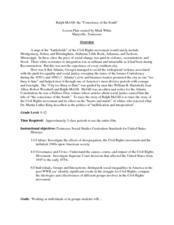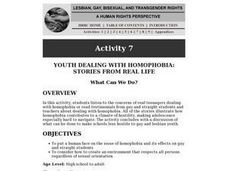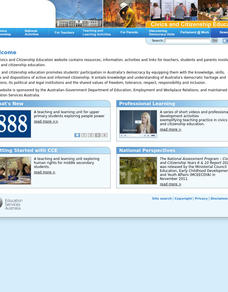Curated OER
Children's Literature Meets Learning Theories
Students examine learning theories and principles through children's literature. In groups, they select theories and create multimedia presentations exemplifying them. Students discuss the various themes related to human growth,...
Curated OER
Sight and Light
Young scholars examine the eyeball and its parts. In this sight lesson students divide into groups and complete a lab activity that includes creating a model.
Curated OER
Economic and Social Changes in the High Middle Ages
Young scholars investigate the economic and social changes that occurred in the High Middle Ages. They listen to a lecture and take notes, and in small groups compose a medieval charter and role-play its presentation to the class.
Curated OER
Funny Face Self Portraits
Students gain appreciation for the drawings by Leonardo da Vinci. They show human emotion by drawing facial features in correct proportion - studying ratio of eye width to the rest of the facial features. They create values by varying...
Curated OER
Invertebrates and Vertebrate Evolution
Students explore the major characteristics of the major animal phyla. They describe adaptive features that have contributed to the success of animals on land. Students explain how primate evolution provides a context for understanding...
Curated OER
The Abolitionist Movement
Students examine the Abolitionist Movement in Delaware. In groups, they examine a petition presented to the general assembly and an anti-slavery broadside. They compare and contrast the two documents and develop their own broadside to...
Curated OER
Salmon Migration
Students examine how salmon find their way to their home stream during migration. In this migration lesson students see some of the different migratory challenges that salmon face and see how humans affect the migration by completing an...
Curated OER
Creating the Model
Students comprehend what has been explored in the previous earthquake engineering design lessons, by putting their designs to the test.
They are given pairs a piece of paper, and an empty plastic bottle or can. Students stand the...
Curated OER
Plants and Animals: Partners in Pollination
Students identify the plant parts and bee structures that are involved in pollination. They simulate pollination in a group activity and process the information.
Curated OER
Fifty States
Fifth graders find each state and its capital city on a map before memorizing the information. They work in small groups after watching a modeled activity by the teachers. They write a statement about their assigned states and capital...
Curated OER
Personality Development
Students participate in a variety of activities to help them define their own personalities. They complete questionnaires, play personality Bingo, and compare kaleidoscopes and candy to the variety found in humans.
Curated OER
You Don't Say!!
Fourth graders write and respond to sayings throughout the school year. They define the idioms, illustrate them and compare their meanings with other groups in the class.
Curated OER
Sheep Brain Dissection
Students study the brain and examine what the functions of the major functions are. In this investigative instructional activity students dissect a sheep's brain and note the similarities and differences between it and a humans brain.
Curated OER
New D.C. Memorial to Honor Dr. King
Students read and discuss a news article about a memorial being built in honor of Dr. King in Washington D.C. They develop a list of facts about Dr. King, complete a fill-in-the blank activity, answer article comprehension questions,...
Curated OER
The Digestive And Urinary Systems
In this digestive and urinary systems worksheet, students solve 4 puzzles or riddles, They complete anagrams, chose the odd one out and use clues to solve a digestive tract riddle.
Curated OER
Freedom on My Mind: A Marginalized Voice in the Segregated South
High schoolers analyze the film, "Freedom on My Mind." They view the film and discuss its points in small groups. They create a fictional southern state reflecting segregation in the 1960's. They present their states to the class.
Curated OER
Ralph McGill: the "Conscience of the South"
Students view a film, "Dawn's Early Light: Ralph McGill and the Segregated South." As groups of students observe the movie, they list key dates, significant persons interviewed, and cultural characteristics. Upon completion of the movie,...
Curated OER
Diwali
Pupils participate in the retelling of a story. After reading the story Diwali, students working in groups retell the significant events in the story through role play. In addition, they discuss the significance of the Hindu elements...
Curated OER
Youth Dealing With Homophobia:Stories From Real Life
Students read testimonials of real gay and lesbian teenagers dealing with homophobia. They discuss how to create an environment that respects all persons regardless of sexual orientation. They discuss a variety of emotions that these...
Curated OER
Ethnic Diversity
High schoolers explore the ethnic diversity of the British military. In this diversity lesson, students discuss the British West Indies Regiment rebellion and the reasons they believed it took place. High schoolers also study the...
Curated OER
Religious Freedom and Persecution throughout the World
Pupils discuss the role of religion throughout the world. Using documents from the United Nations, they read through Article 18 and describe it in detail. In groups, they identify religions based on how much freedom or persecution is...
Curated OER
A Dialogue With Your Lettuce
Students, in groups, create questions they would ask about a head of lettuce in their refrigerator (e.g., Where were you grown? Who picked you? What were the working conditions?). They exchange questions with another group and then...
Curated OER
Changing for the Common Good
High schoolers examine the nonprofit sector and how it has made positive changes in society. They create a timeline noting events related to disadvantaged groups. They work together to research the events.
Curated OER
Can young people influence government?
Students, working as a whole class, think about and debate the question of influence. First, there will be some group work then a class debate. The question for debate is: Can young citizens have any influence on governments?








